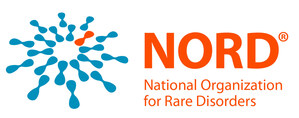WASHINGTON, Dec. 13, 2016 /PRNewswire-USNewswire/ -- A majority of states are not measuring up on legislative solutions that reduce the burden of rare diseases affecting 30 million Americans, according to a new report released today by the National Organization for Rare Disorders Rare Action Network (NORD RAN). The report, "State Report Card: A Roadmap to Improve the Lives of People with Rare Diseases," indicates that progress in several areas of health policy is slow.
"The statistics on rare diseases demand our attention as a public health issue. There are 7,000 rare diseases that combined affect 30 million Americans, or 1 in 10 people," said Peter L. Saltonstall, president and CEO of NORD. "State lawmakers play an important role in determining individual access to health care and the NORD RAN State Report Card indicates that states' laws are failing their constituents."
The second annual edition of the NORD RAN State Report Card rates states on the strength of policies including coverage of medical foods and newborn screening, as well as prescription drug cost-sharing limits. New this year, the report examines policies supporting biosimilar prescriber communications, protections against step therapy protocols, and the establishment of rare disease advisory councils. The report also looks at whether or not states have accepted available federal funds to increase access to care through their Medicaid program, including the Children's Health Insurance Program (CHIP).
Overall, the report found that:
- Forty-one states earned an F for failing to enact prescription drug cost-sharing limits, despite third-party analysis showing these cause little to no impact on overall plan premiums for all beneficiaries;
- Newborn screening has saved tens of thousands of lives, yet more than 40 percent of states fail to meet the minimum requirements;
- Eighteen states scored a D or F for poor adoption of Affordable Care Act-funded expansion of Medicaid, which has likely reached its endpoint for the foreseeable future;
- Four states earned a perfect score for their coverage of life-sustaining medical foods, which serve as the only viable treatment for certain rare disorders;
- There are now 30 states with laws on the books requiring biosimilar prescriber communication laws to protect patient safety;
- Nine states earned an A or B for protecting patients against step therapy, a procedure by which insurers (public or private) interfere with and delay appropriate care for patients that ultimately increases costs;
- Three states have successfully implemented Rare Disease Advisory Councils within the state government and nine more will consider legislation in 2017;
- One state, Kansas, received a failing grade in all seven categories;
- All but one state, California, failed to meet benchmarks in six of seven legislative priority areas;
A color-coded grading system is used to identify how well a state is doing. Blue represents "Grade A", or the ideal state policy that serves as a model for others to follow, and ranges to orange indicating a "Grade F", for a state has no policy in place or inadequate policy.
The NORD RAN State Report Card also offers a vision statement and guidance for each policy area as a way to benefit rare disease patients and their families. In addition, the report provides tools for individuals to act on the State Report Card.
"The ultimate purpose of this report is to educate and empower advocates to effect change in their state," said NORD Associate Director of State Policy, Tim Boyd. "We aim to provide actionable steps for states that will make meaningful improvements in people's lives. Our team is committed to working with advocates and legislators until ideal policies are achieved in all 50 states and the District of Columbia."
To support the launch of the 2016 State Report Card, NORD is introducing a designated website for the Rare Action Network, its network of advocates working together to enact pro-rare disease patient policy. The website offers tools, training and resources to everyday people to become effective advocates for rare diseases through policy, education and awareness events for both national and state based initiatives across the U.S. For more information and to view the national summary, state-by-state breakdowns, maps, contacts, resources and a full copy of the NORD RAN State Report Card, visit www.rareaction.org.
For more than 30 years, NORD, a 501(c)(3) independent, nonpartisan charity, has been the nation's voice on rare diseases and at the forefront of patient advocacy. NORD's Rare Action Network is the nation's leading rare disease advocacy network working to improve the lives of the 30 million Americans impacted by rare disease. The goal of RAN is to ensure that the rare disease community is represented and supported in all 50 states and to advocate for changes that better patients.
About the National Organization for Rare Disorders (NORD)®
The National Organization for Rare Disorders (NORD)® is the leading independent advocacy organization representing all patients and families affected by rare diseases. NORD is committed to the identification, treatment and cure of the 7,000 rare diseases that affect 30 million Americans, or 1 in every 10 people. NORD began as a small group of patient advocates that formed a coalition to unify and mobilize support to pass the Orphan Drug Act of 1983. For more than 30 years, NORD has led the way in voicing the needs of the rare disease community, driving supportive policies and education, advancing medical research, and providing patient and family services for those who need them most. NORD represents more than 250 disease-specific member organizations and collaborates with many other organizations in specific causes of importance to the rare disease patient community. www.rarediseases.org.
SOURCE National Organization for Rare Disorders (NORD)
Related Links
WANT YOUR COMPANY'S NEWS FEATURED ON PRNEWSWIRE.COM?
Newsrooms &
Influencers
Digital Media
Outlets
Journalists
Opted In






Share this article